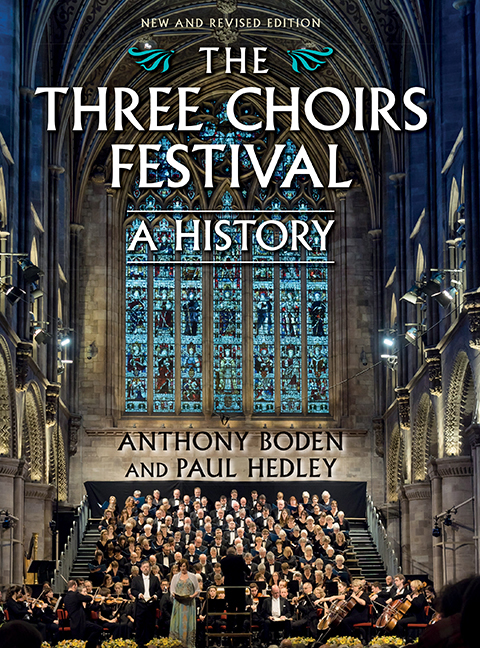Book contents
- Frontmatter
- Contents
- List of Illustrations
- Preface
- Acknowledgements
- List of Abbreviations
- List of Cathedral Organists
- 1 Origins
- 2 A Fortuitous and Friendly Proposal
- 3 A Numerous Appearance of Gentry
- 4 ‘The Musick of my Admiration Handel’
- 5 The Gentlemen and the Players
- 6 Avoiding Shipwreck
- 7 Prima voce
- 8 Favourites and Flops
- 9 Sacred and Profane
- 10 Froissart
- 11 The Unreasonable Man
- 12 The Dream
- 13 Beyond these Voices
- 14 An Essentially English Institution
- 15 The Elgar Festivals
- 16 Dona nobis pacem
- 17 Recovery
- 18 Association
- 19 A New Epoch
- 20 Jubilee
- 21 Theme with Variations
- 22 Houses of the Mind
- 23 ‘A Gold-Plated Orchestra’
- 24 A New Millennium
- 25 Reorganisation
- 26 An Invitation to the Palace
- Appendix Three Choirs Festival Timeline
- Select Bibliography
- Index
- Plate section
9 - Sacred and Profane
Published online by Cambridge University Press: 11 August 2017
- Frontmatter
- Contents
- List of Illustrations
- Preface
- Acknowledgements
- List of Abbreviations
- List of Cathedral Organists
- 1 Origins
- 2 A Fortuitous and Friendly Proposal
- 3 A Numerous Appearance of Gentry
- 4 ‘The Musick of my Admiration Handel’
- 5 The Gentlemen and the Players
- 6 Avoiding Shipwreck
- 7 Prima voce
- 8 Favourites and Flops
- 9 Sacred and Profane
- 10 Froissart
- 11 The Unreasonable Man
- 12 The Dream
- 13 Beyond these Voices
- 14 An Essentially English Institution
- 15 The Elgar Festivals
- 16 Dona nobis pacem
- 17 Recovery
- 18 Association
- 19 A New Epoch
- 20 Jubilee
- 21 Theme with Variations
- 22 Houses of the Mind
- 23 ‘A Gold-Plated Orchestra’
- 24 A New Millennium
- 25 Reorganisation
- 26 An Invitation to the Palace
- Appendix Three Choirs Festival Timeline
- Select Bibliography
- Index
- Plate section
Summary
If we seek for a definite birthday for modern English music, September 7, 1880, when Prometheus saw the light at Gloucester and met with a mixed reception, has undoubtedly the best claim.
WITH his cantata Prometheus Unbound, a setting of scenes from Shelley's epic poem, Hubert Parry (1848–1918) strode into the midst of all that was conventional and ‘safe’ in English choral music and unwittingly became, in the words of Herbert Howells, ‘a near revolutionary’. Every conceivable obstacle stood in the way of his success.
In spite of his championship of Three Choirs as a Steward over many years, Parry's father, Thomas Gambier Parry, squire at Highnam Court near Gloucester, would not tolerate music as a profession for his children and forbade his eldest son, Clinton, to pursue it. Following his education at Eton and Oxford, Hubert was obliged against his will to take up a career in insurance and to limit his musical activities to those of an amateur. His first offering to Three Choirs was an Intermezzo religioso (1868(G)) which, in the judgement of the Pall Mall Gazette of 12 September 1868, ‘in no way belied its amateur origin’. In 1877, following seven years at Lloyds Register of Shipping – which ended in financial disaster – he was at last able to take up music as his chosen profession. Meanwhile, in 1873, he had begun regular lessons with the concert pianist Edward Dannreuther, who introduced Parry to the music of Wagner and provided him with free tickets to visit Bayreuth for the first performance of The Ring there in 1876.
Parry returned from Bayreuth aglow with inspiration; but many of the English critics were scathing about the ‘so-called Prophet of the Future, Richard Wagner’. Except for Dannreuther, Parry's friends pilloried him for turning towards ‘the music of the future’ in his own composition. By this time he had also further alienated himself from his father and contemporary society by renouncing Christian doctrine. Even so, uncomfortable isolation was no deterrent from his boldness in choosing a poem by Shelley as the inspiration for his first major choral work.
- Type
- Chapter
- Information
- The Three Choirs Festival: A HistoryNew and Revised Edition, pp. 130 - 143Publisher: Boydell & BrewerPrint publication year: 2017

